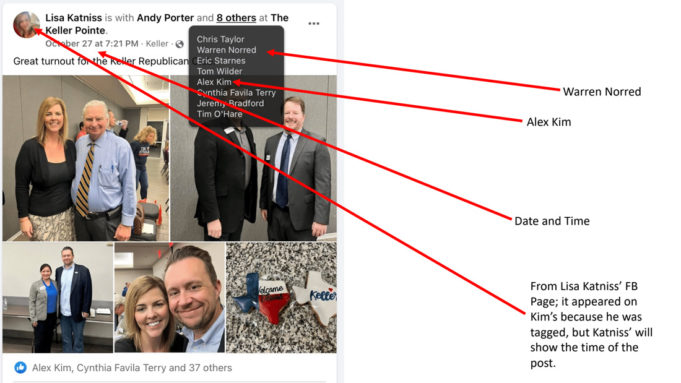Judge Alex Kim has received steady, largely critical press since his 2019 election to Texas’ 323rd District Court, which oversees juvenile crimes in Tarrant County. Two years ago, a committee of local district judges removed CPS cases from his Northside courtroom. Although the committee made the decision in private, it was widely believed at the time that the judges took action due to Kim’s perceived bias against volunteers from Tarrant County’s CASA (Court-Appointed Special Advocates), a nonprofit that helps children in the court system and foster care.
Kim recently said the negative press belies important improvements he’s made to the 323rd over the past three years. Juveniles are effectively guaranteed a trial within six months, something Kim said puts his courtroom far ahead of backlogged adult criminal and family courts. Kim’s staff works with local school districts to ensure that the juveniles do not fall behind academically while being detained and that parents can visit their children seven days a week.
Juvenile crime, he added, has decreased under his tenure, partly because of his stringent handling of firearms cases. The district judge provided me with data compiled by his office that show a recent sharp decline in the number of juveniles entering his court.
Kim said that juveniles know that if they steal a gun or are caught using a firearm during a crime, they will not be released quickly. The juvenile court judge views his sentencing practices as preventing bloodshed in the streets. Kim’s many critics see his rulings as overly harsh, and not everyone is pleased with his work.
Two years ago, staffers and volunteers with CASA alleged that Kim was not assigning them for political reasons. Even though the decline in CASA volunteers was never disputed, Kim rebuked any notion that his decisions were politically motivated. In conservative circles, the work performed by CPS caseworkers and CASA volunteers is seen as a threat to parental rights. From the decision by the committee of district judges, cases tied to CPS are now distributed throughout the county’s family court system and no longer go through Kim.
A confidential source recently sent me an unredacted and lengthy complaint filed by Fort Worth attorneys Stephanie Patten and Greg Westfall. In the April letter to the State Commission on Judicial Conduct, the lawyers allege that Kim routinely sent minors to Tarrant County Jail as punishment for cursing in court and other minor offenses even though sending children to jail violated Texas Family Code, the body of laws that cover marriages, parental authority, and how minors are treated while under the care of the government, among other provisions.
Included among the files sent to the judicial conduct commission is a YouTube video from May 21, 2021, that shows Judge Kim ordering a juvenile to jail.
“Let’s get the paperwork,” Kim says during the Zoom meeting. “I’m going to transfer him to Tarrant County Jail on his 17th birthday. He can finish out waiting for his case downtown.”
Under Texas Family Code, any minor who commits an offense before the age of 17 is considered a child until they turn 18, meaning Kim was ordering the transfer of a child to a county jail. Texas Family Code allows children to be detained in a county jail only if a certified juvenile detention facility “is not available in the county.” Tarrant County Juvenile Services operates the Lynn W. Ross Juvenile Detention Center, which means Kim’s order violated the family code. The lawyers also allege that Kim’s actions violated the Prison Rape Elimination Act, a federal law that forbids any contact between children and adults in confinement, which could mean jail, where defendants serve short sentences, or prisons, which hold serious offenders for several years or longer.
Kim said that when it comes to 17-year-olds, there are conflicting legal definitions on whether that minor is an adult or a child. Under state criminal law, 17-year-olds are considered adults while they may be seen as children under family law.
“This is one of the areas where there is a gap between family and criminal law,” Kim said. “There are laws in Texas about the detention of children, but those largely fall under the Prison Rape Elimination Act, which is a federal law. That restrains the adult jail. The adult jail cannot put children under 17 with people who are 18 and older.”
Tarrant County Sheriff Bill Waybourn, who oversees the county jail, mixes 17- and 18-year-olds who are detained at his jail, Kim said.
“There is that gap when they are 17 that state law treats differently,” depending on whether judges are considering criminal or family laws, Kim said.
Along with citations by lawyers Patten and Westfall for violations of several Canons of Judicial Conduct is an allegation from the two attorneys that Kim broke a state penal code related to Official Oppression, which forbids office holders like district judges from intentionally mistreating or detaining an individual in a manner they know “is unlawful.”
Within the complaint are more than two dozen copies of jail custody records that show the names of 24 juveniles who spent more than 900 days in Tarrant County Jail over the past few years, based on records shared by Patten and Westfall with the judicial conduct commission.
A spokesperson with the sheriff’s department did not respond to my questions related to the potentially unlawful detentions of 17-year-olds at the county jail.
In September, based on court records, Kim ordered a 17-year-old to 180 days in Tarrant County Jail because the child allegedly cursed at the judge and become disruptive during a hearing. Based on court records, Kim then threatened the minor with an additional 80 hours of community service if he sought relief from a state court of appeals. The minor, whose name we are concealing to protect his privacy and shield him from retaliation, sought and was given relief in November. Kim said he appointed the 17-year-old a defense attorney shortly after sentencing him to the 180 days and welcomed any clarity from an appellate justice on whether dependents under 18 can be transferred to the county jail.
The appeals court judge ruled that Kim’s 180-day jail sentence was void because it deprived the child of due process.
In the court order, Justice Mike Wallach notes that any 17-year-old who committed an offense before turning 17 is considered a child by the state court system even when that child turns 17. Under state law, children cannot be confined in jail for more than 10 days.
Kim said that Wallach’s ruling clarified ambiguity in the two systems of state law and that he has now stopped the practice of sending 17-year-olds to the county jail.
Helping to document Kim’s alleged judicial misconduct are his livestreamed court proceedings on YouTube during and after COVID-19-related lockdowns. Based on the complaint, Kim turned his court into a “reality TV show” that may have violated privacy protections afforded to children. A glance at Kim’s YouTube channel shows that it remains active with more than 11,000 subscribers, but the hundreds of videos involving children have been either pulled or made private.
Kim created his channel in 2020 after the Supreme Court of Texas and the Court of Criminal Appeals issued an emergency order that authorized all courts to conduct proceedings virtually.
Kim, the complaint reads, “has a YouTube channel that he personally controls (as opposed to going through the Office of Court Administration) that is accessible through Tarrant County’s website,” referring to the personal channel that allowed Kim to earn $9,000 in advertising revenue, based on public discussions in Tarrant County’s commissioners court. “He allows real-time commentary from viewers which runs down the side of the screen. In comments, viewers routinely cheer Kim’s decisions to detain juveniles. He actually detains so many juveniles that the Juvenile Detention Center is often kept at capacity or over-capacity.”
The attorneys’ allegations regarding crowding at the juvenile detention center are backed by public statements by one corrections officer. As reported in an April story by the Star-Telegram, the county’s chief probation officer, Bennie Medlin, told the Tarrant County Juvenile Detention Board that overcrowding at the Juvenile Detention Center has created an unhealthy and unsafe environment for youths.
Kim told me that around 25 juveniles are awaiting transfer to one or more state schools managed by the Texas Juvenile Justice Department. Staffing shortages at that agency are causing backlogs at Tarrant County’s juvenile detention center, Kim said, not any of his actions.
In the letter to the judicial conduct commission, the lawyers also allege that Kim violated a penal code tied to abuse of power, based on the money he earned from his YouTube website. By using government resources, the lawyers say, Kim sought to defraud the government by misusing government property for personal benefit. Texas courts relied heavily on Zoom sessions throughout the worst of the pandemic, but the attorneys say Kim’s use of livestream videos were not conducted for safety reasons because they continued until a few months ago. Kim has stated publicly that he never withdrew the YouTube funds and always intended to transfer the money to the county.
“One thing that stands out from watching these videos, or any of the other hundreds of videotaped hearings, is just the exploitative nature of the entire exercise,” the complaint reads. “Like an actual reality show, Kim often treats the litigants — especially parents of the children — with contempt. He then seems to look for points at which he can cause a conflict with a parent. These dramatic moments are streamed live on the internet and then stored publicly. This makes a mockery of the confidentiality protections of the juvenile system.”
Within the complaint are several court filings in which Kim waived jurisdiction of a minor’s case and transferred the child to adult criminal courts.
The number of juvenile cases tried in the adult criminal justice system has been on the rise since the 1990s, based on findings by the Juvenile Law Center, a nonprofit that advocates for youths in the child welfare and justice systems.
“Scientific research shows key developmental differences between youth and adults that impact a youth’s decision-making, impulse control, and susceptibility to peer pressure,” reads an article by the Juvenile Law Center. “While these differences do not excuse youth from responsibility for their actions, the U.S. Supreme Court has repeatedly recognized that youths are less blameworthy than adults and more capable of change and rehabilitation.”
The lawyers’ complaint concludes with an allegation that Kim signed two temporary restraining orders (TROs) for politically motivated reasons. In October 2021, Kim issued two TROs to mandate medical staff at two local hospitals to administer Ivermectin — a deworming drug used primarily to treat horses — to two adults, including one sheriff’s deputy, who were stricken with COVID-19. At the time and contrary to the former president’s lies about the drug’s efficacy, the American Medical Association warned against the unproven use of Ivermectin to treat viruses, including COVID-19. Copies of the TROs signed by Kim are included in the complaint.
Judges with Fort Worth district courts overturned both TROs, noting that the courts cannot mandate hospital staff to administer unproven and potentially dangerous drugs to patients and that a family court judge has no authority to hand-deliver a TRO in matters that require civil cases to be randomly assigned by the county clerk. Included in the complaint is a Facebook photo showing District Clerk Tom Wilder, county judge candidate Tim O’Hare, and Judge Kim at a Keller Republican Club meeting around the time Kim signed the second TRO.
“For Judge Kim, signing these TROs was more of a political statement than a deeply held belief that he was doing the right thing,” the complaint reads. “The attorney of record [for one TRO], Warren Norred, is a well-known conservative activist in Tarrant County. Alex Kim has cultivated the same reputation. Included in the letter is a Facebook screenshot that places Kim with Norred at a Keller Republican Club meeting the same day — and within the same hour — the second TRO was signed.”
In June, judges with the State Commission on Judicial Conduct said that Kim’s actions were not necessarily appropriate but did not rise to the level of sanctionable misconduct.
“The commission remains confident that the conduct will not occur in the future,” the commission writes.
This story is part of City in Crisis, an ongoing series of reports on unethical behavior and worse by local public leaders, featuring original reporting. The next one, on the district attorney’s office, will appear in the Aug. 10 issue.













“Kim’s actions were not necessarily appropriate but did not rise to the level of (sanctionable) misconduct ” aptly sums up why the rampant abuses have occurred, are occuring, and will continue to occur despite the Commission ‘s “confidence” that the clear misconducts (just not sanctionable) “will not occur in the future.” The modern day American priestly class, with their elevated status, priestly language/Legalese, etc., used their power to protect one of their own high priests and then uses their priestly power to foresee the future (“will not occur in the future”) and to absolve the member of the priesthood–kinda like transferring one brother to another parrish because the misconduct is *so common* among the priesthood that the priestly counsel investigating doesn’t see it “rising to the level of sanctionable misconduct.” We lowly lay persons and commoners will just have to accept that we cannot do anything to touch our contemporary high priestly (and even royal) class, as not so subtly communicated in the language they demand we use such as only referring to them as “your honor” and “pray for relief” from them.
The thing that I most appreciated about Alex Kim’s courts is the TRANSPARENCY live YouTube streams provided to a viewing public. The Texas Constitution says that the courts shall remain open (Article 1, Section 13). In Backgrounds and Legal Standards – Public Right to Access to Remote Hearings During the COVID-19 Pandemic, Judge Roy Ferguson wrote the following:
It bears mentioning that this is not a new issue created by video hearings or public livestreaming. Sensitive and embarrassing testimony is entered in every contested family law hearing yet rarely merits closure or clearing of courtrooms. Child protection cases categorically involve evidence that is or may be damaging or embarrassing to the child. Commercial disputes commonly involve protected internal corporate operations. Rarely – if ever – have such trials been closed to the public. Such testimony should not now be evaluated differently simply because more people may exercise their constitutional right to view court proceedings than ever before. Public exercise of a constitutional right does not change the court’s evaluation of whether that right should be protected. Nor should courts erect barriers or hurdles to public attendance at hearings to discourage public exercise of that right. On the contrary, courts are required to take whatever steps are reasonably calculated to accommodate public attendance. CLOSURE OF THE COURTROOMS IS CONSTITUTIONALLY SUSPECT AND RISK AND SHOULD BE A LAST RESORT.
The transparency that Judge Alex Kim exhibited with his YouTube feeds enabled the public to criticize or defend him, his court, and his actions. I believe that ALL COURTS should be as transparent as his was and that LIVE VIDEO AND AUDIO FEEDS OF EVERY HEARING should be the ongoing practice of EVERY COURT IN TEXAS. If the public saw what goes on in the courts – particularly the “Family” Courts – they would be enraged and demand that legislators start impeaching some of the judges for their egregiously unconstitutional and bad behavior – and they would start filing ethical complaints against many attorneys who act in unconscionable ways.
We NEED open courts. Public opinion is a strong bulwark against judicial abuse. The state of our courts is a complete mess. I have attended over 100 hearings in person or view YouTube or Zoom, and I am still astounded at the “family” court injustice that is meted out on a daily basis.
Jeff Morgan, Dallas, Texas
My Son Jaylen Rice Is one of those children in this story In an action under Kim’s ruling that still haunts us today and we are still going dealing with his cruel and harsh acts Retaliation and Kim’s political agenda towards Jaylen not getting up for his Zoom detention hearing on October 31, 2020, right now he is in the Tarrant County Jail because he has been held hostage to this corrupt system that has failed our children and hold the people in charge accountable for violating what we call the Constitution’s “due process.” my question will be why is Kim the District Judge of 323rd? let me answer that because we have people with their own political agendas who are blinded by his actions which is a crime. i’ll call them out Chris Wolf Who is the district judge in the 213th Tarrant county district court and William Knight Who is currently the prosecutor on my sons case. there are many many more including court-appointed attorneys and paid attorneys in Tarrant County who I will be naming soon as well and seeing that all involved is held accountable. I will not shut up like I was told to do by Steve Gordon who was court appointed I just call him a black man stuck in a white man’s body. there are so many layers to my son’s story. #ReleaseJaylenRice